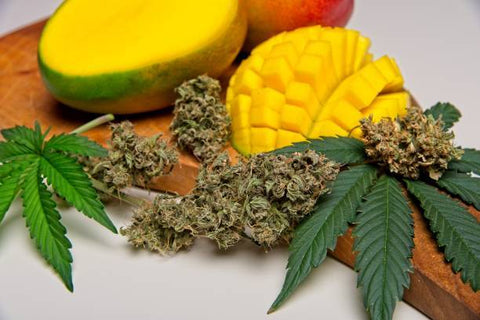The popularity of cannabis extracts like cannabinoids as alternatives to prescription medications is on the rise in the cannabis industry, and understandably so. As natural compounds, cannabis extracts come with negligible side effects and virtually no potential for dependence or abuse.
Unlike THC, which is still classified as a controlled substance under federal law, other cannabinoids like cannabidiol (CBD) and cannabigerol (CBG) are non-psychoactive. They are legal for sale and consumption across all 50 states.
Of course, the therapeutic potential of marijuana and hemp plants is not limited to well-known cannabis compounds. Other cannabinoids like cannabinol (CBN) and the terpenes in different strains of cannabis have been shown to relieve symptoms of several health disorders prevalent in the United States.
Of the many cannabinoids currently being studied for their potential roles in treating a medical condition, delta-8 THC — arguably a synthetic cannabinoid — is arguably the most popular on the market today due to its high demand and unique neurophysiological effects.
In this post, we go over what you need to know about delta-8 and how its effects can be enhanced with cannabis terpenes.
What is Delta-8 THC?
Delta-8 is an isomer of delta-9 THC, with the main difference being their respective positions of double bonds. Although they have similar effects on the body, key differences in psychoactivity set them apart. Delta-8 is known to be a CB receptor agonist, making it helpful for managing symptoms associated with neurophysiological conditions like anxiety, mood or sleeping problems. This is why delta-8 has not yet been deemed illegal by federal law.
While THC is linked with pain relief and a sense of relaxation, delta-8 has been found to boost attention, hunger and wakefulness.
How is Delta-8 produced?
Delta-8 THC is not exclusively produced from marijuana or directly from the hemp plant; it's most commonly sourced from hemp-derived CBD extracted using solvents such as butane, ethanol, or propane. This CBD is refined or “converted” to delta-8 THC by refluxing it in an acid like toluene or heptane. It is a highly concentrated from of THC and can also be known as Delta 8 distillate.
What Are Terpenes?
Terpenes are naturally occurring aromatic compounds present in virtually all plant life. They can be found in flowers, fruits, spices, and insects. They are the key ingredient in essential oils, responsible for their unique flavors, aroma profiles and therapeutic properties.
Terpene content varies between plant species and different cannabis strains, playing critical roles throughout the various stages of plant growth cycles. They work as a natural pesticide, can ward off foragers, and even attract pollinators. There are even some terpenes that have antibacterial and antifungal properties, which help protect plants from disease.
Businesses use terpenes to create perfumes, cleaning solutions, and bath products. A growing interest in the potential medicinal value of the cannabis plant and cannabis-derived products has brought terpenes into mainstream conversation and spurred research into its viability as a therapeutic for everything from muscle spasms to mood disorders.
Does Delta-8 Have Terpenes?
There's some debate as to whether or not delta-8 concentrates contain terpenes.
Most terpene-infused or "terped" delta-8 likely had them added in after the conversion process from CBD. It's not uncommon for some of the same terpenes found in marijuana (like myrcene, limonene, and linalool) to also be present in many delta-8 products, but this is not typically the result of converting hemp-derived CBD into delta-8.
Terpenes are included in many delta-8 products because they work synergistically with the effects delta-8 is known for. For example, myrcene gives off an earthy aroma and is known for its anxiolytic effects, while limonene is often added for its citrusy smell and anti-inflammatory properties. These are amplified by delta-8's psychoactive quality that leaves users feeling both euphoric and energized.

Delta-8, Terpenes & The Entourage Effect
The synergistic effects of cannabinoids and terpenes on the body's endocannabinoid system are well-documented and popularized under an umbrella term known as the "Entourage Effect."
Entourage effects take place between both combinations of cannabinoids (e.g., THC and CBD in a full-spectrum formulation) and combinations of terpenes and cannabinoids (e.g., THC and myrcene in the strain Grandaddy Purple).
Adding terpenes to Delta-8 has been shown to create many benefits, including anti-inflammatory and focus-enhancing effects.
Modifying Delta 8's Effects & Taste with Terpenes
It's important to note that potential entourage effects involving delta-8 THC aren't just limited to cannabis-derived terpenes. Individuals looking to enhance the flavor and aroma of their delta-8 concentrates can use limonene sourced from Sour Diesel buds or citrus peels while simultaneously complementing the neuroprotective properties of delta-8.
DIYers making homemade cartridges can incorporate alpha-pinene into their formulations, whether from nuggets of Blue Dream or sprigs of rosemary. This may create a synergistic anticancer influence on the body's endocannabinoid receptors.
Whether or not terpenes are sourced from marijuana, users don't have to worry about the risk of intoxicating effects because of their isolation from THC, the primary psychoactive compound in cannabis.
Intoxication aside, it's still recommended that prospective users seek their doctor's advice in assessing their risk profile before using cannabinoids or terpenes to supplement conventional treatments for any medical condition.
Commercial Delta-8 Products Infused with Terpenes
As delta-8 THC rapidly gains popularity in the legal cannabis industry, standard delta-8 products infused with terpenes are a common sight on dispensary shelves everywhere from Oregon to Rhode Island, and for a good reason.
Because of their effects on flavor, aroma and therapeutic potential, terpenes make a natural addition to a range of delta-8 products, including:
- Distillate Syringes
- Cartridges
- Topicals
- Gummies
- Vape Cartridges
- E-Juices
- Strain-Specific Hemp Flowers
Far from being a marketing ploy or gimmick, terpene infusion into delta-8 products isn't limited to online or brick-and-mortar weed shops, as is evidenced by the popularity of the practice among DIYers.
Let's close out the article by looking at how you can add terpenes to your own delta-8 products.
How to Add Terpenes to Delta 8 Distillates at Home
Some consumers find the terped delta-8 products already on market shelves to be just fine for their tastes, but other customers prefer having full control over their delta-8 supplementation. Customizing delta-8 distillates is a pretty simple process.
Below, we'll review two key rules to remember when doing this at home.
Heat distillate in the bath
Delta 8 distillate is so viscous at room temperature that it's practically solid. The safest, most reliable way to gently heat the oil is by putting it in a shatter-proof glass container left in a warm water bath until the consistency is easier to incorporate terpene oil into it. The bath temperature should be close to boiling, between 150-175°F.
Add terpenes conservatively
When selecting terpenes, consider not just the therapeutic properties but their flavors and aromas.
Start with conservative amounts; you can always add more later if needed. A good starting ratio is 1-2 drops (0.05-0.1ml) of terpenes per 1ml of delta-8 distillate.
For best results, leave the distillate to set for approximately 24 hours. The setting time allows the delta-8 distillate to fully infuse with your terpene blend.

